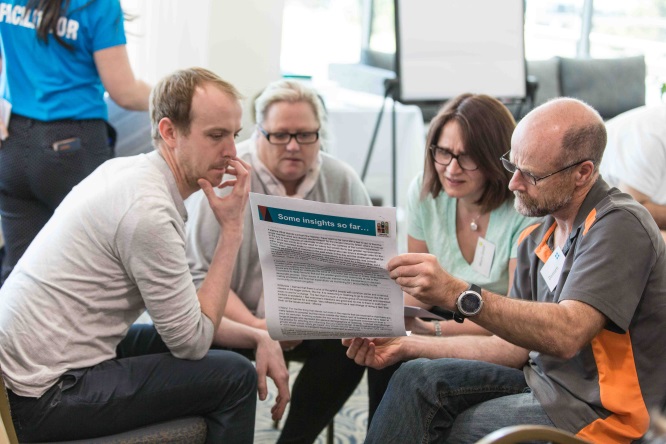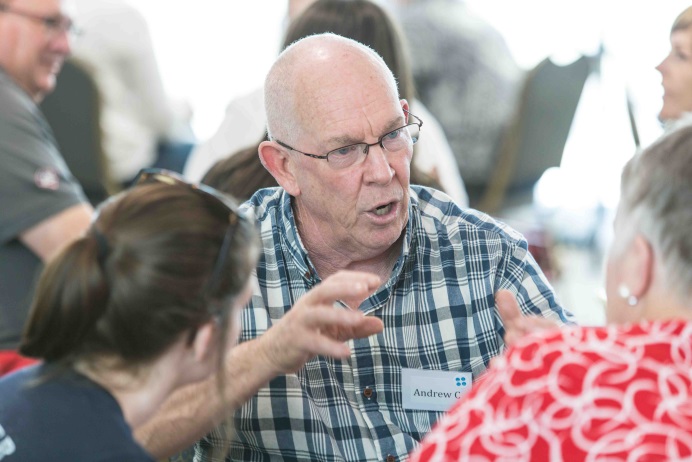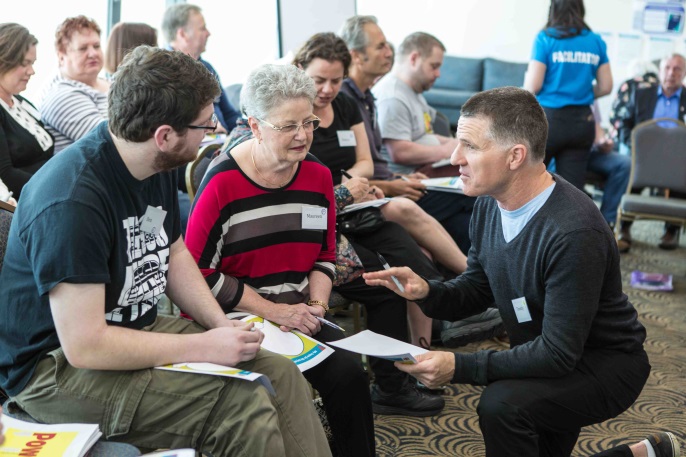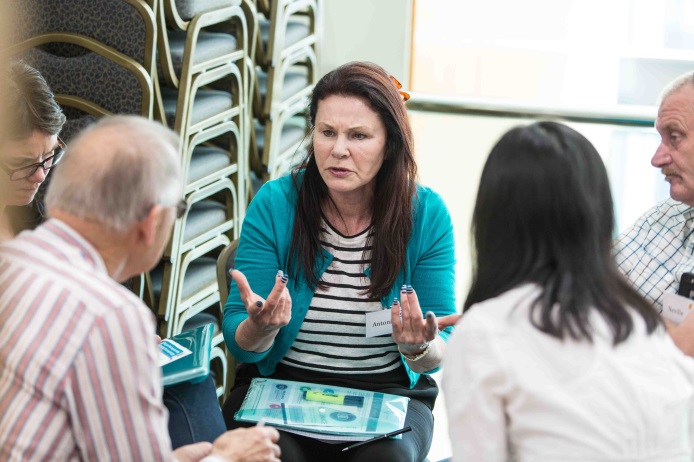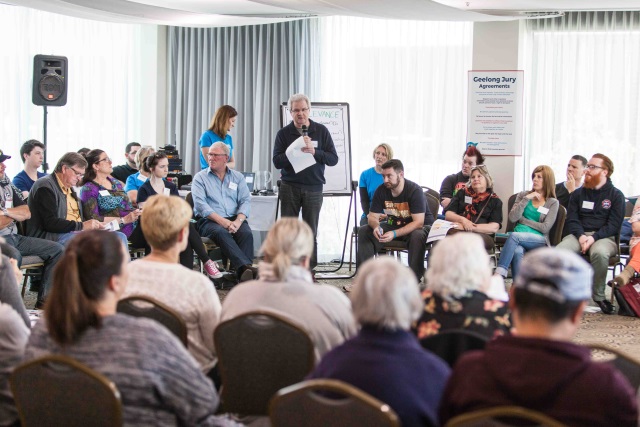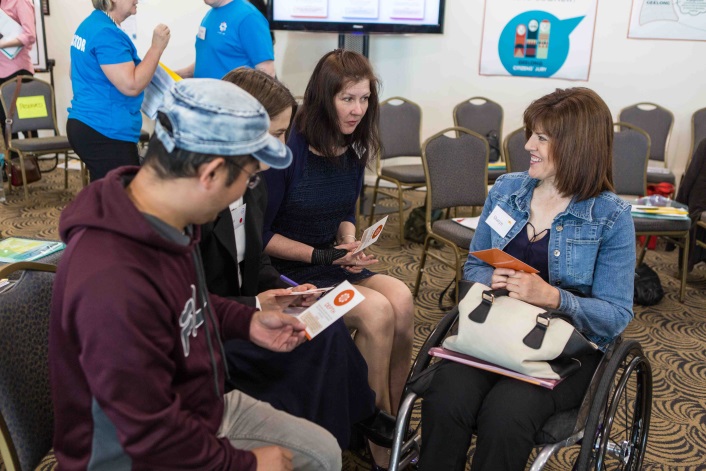AN AWARD WINNING PROJECT
The Democracy in Geelong (Geelong Citizens’ Jury) project was a ground-breaking engagement process – no other community had ever had the chance to influence its council’s structure to this extent.
Following the dismissal of the City of Greater Geelong Council in April 2016, the Victorian Government committed to consult the community about the structure of its future elected council. MosaicLab was engaged by Local Government Victoria to design and facilitate discussions and activities for both the online and face to face components of the process, which asked 100 randomly selected and descriptively representative Geelong residents respond to the following remit:
‘Our council was dismissed. How do we want to be democratically represented by a future council?’.
The jury, which met over 4 days and considered a wide range of inputs and information, was independently selected and overseen by the non-partisan research organisation the newDemocracy Foundation (nDF). The jury made two types of recommendations:
Practical recommendations for an electoral structure that complied with existing legislative frameworks
Aspirational recommendations to improve local democracy
The Minister for Local Government tabled the jury’s report in Parliament and made a formal response to the jury on the 18th March 2017.
On 19th October 2017 the Department of Environment, Land, Water and Planning with Local Government Victoria and MosaicLab were presented with the IAP2 Australasia 2017 Core Values Award for Community Development and the Highly Commended Project of the Year award. Learn more about all the award winners here.
“A group if representative people of any community can be entrusted to make sound decisions and sound judgments when properly informed.”
VIDEO: Geelong Citizens’ Jury – process overview
“I’m a big believer in people together achieving more than people apart, and I think this has been a really awesome example of democracy in action.”
“It opened my eyes a fair bit - meeting such a diverse group of people and just the way we listened to each other’s points of view was brilliant.”
THE CHALLENGE
In April 2016, the Victorian Parliament passed legislation to dismiss the Greater Geelong City Council (the Council) and provide for the election of a new council in October 2017. The dismissal of the council was in response to the findings and recommendations of the Independent Commission of Inquiry which found that the council was failing to provide good government for the people of Greater Geelong.
The project presented a number of challenges, including:
working with a community lacking in confidence in its government due to a series of recent events including the 2016 dismissal of the council and the issues and investigation that led to this dismissal,
engaging around a complex, politically charged topic with no ‘silver bullet’ answers,
ensuring genuine, diverse local representation from people from all walks of life rather than including only the voices of those with the most personal interest in the outcome,
identifying and reaching the City of Greater Geelong’s many different communities of interest living across its diverse areas (for example, the region stretches across rural, coastal and urban areas),
ensuring the jury agreed on recommendations about their preferred council structure in time for the October 2017 election.
““(Many of us are used to) designing processes we can understand and control – this is something completely different.
The whole process - the way it’s independent, the way the jurors are selected, and particularly the open-ended question – it really lends itself to this great unknown … but that’s part of the excitement and strength of the project. ”
THE PROCESS
Trust in local government is essential both for social cohesion and the council’s continued ability to govern. A citizens’ jury (a deliberative engagement process) is a useful method for building trust between decision-makers and the community, as those that are affected by the decision are placed at the centre of the decision making process.
Importantly, selection and oversight of the jury was independent from both the Minister for Local Government and the Council and was managed by the newDemocracy Foundation (nDF), a non-partisan, philanthropic research foundation. The nDF used a stratification process to ensure the jury was descriptively representative of the community in terms of gender, age and geography.
An integral part of the process was informing the wider community about the process and giving everyone in the Greater Geelong region an opportunity to get involved and contribute ideas to the jury. The wider engagement phase included:
stakeholder briefing sessions,
public workshops (in regionally specific locations),
a 'Vote Democracy Geelong' survey,
opportunities to make a submission,
targeted discussions held with key communities of interest including youth, people with a disability, inter-faith groups and culturally and linguistically diverse communities,
other events and activities including a public ‘discussion’ event hosted by Deakin University.
More than 1200 people participated in the wider engagement activities, and a wider engagement report was published that details the findings of this phase.
VIDEO: Jury members speak about their experience.
“The engagement of the newDemocracy Foundation as the overseers and managers of the process was absolutely critical - it demonstrated independence at every turn.”
SHORT VIDEO: The Victorian Government responds to recommendations made by the Geelong Citizens Jury on a future electoral structure for the Greater Geelong City Council.
FULL LENGTH VIDEO: Minister for Local Government Natalie Hutchins delivers the Victorian Government's response to recommendations by the Geelong Citizens Jury on a new council structure for the City of Greater Geelong.
TOOLS FOR SUCCESS
To support the jurors in their task, ensure their recommendations were the result of informed, in-depth deliberations, and to provide the group with an opportunity to have real influence over the issue, the jury was given:
time to deliberate, weigh up options, grapple with the issues and understand the trade-offs,
access to information and experts to support their deliberations,
a ‘blank sheet’ on which to write their recommendations (while practical recommendations were required to comply with existing Victorian legislation, the jury was also invited to provide aspirational recommendations, which were completely unconstrained),
support from professional facilitators (MosaicLab), who worked to keep the group focused on the task, help the jurors to work together effectively, and support their discussions and deliberations,
an opportunity to place clear and unambiguous requests in front of decision makers,
empowerment to change the system in which the problem sits,
a strong promise by the Minister for Local Government, who would table the jury’s report in Parliament, submit the jury’s deliberations to Cabinet and consider all aspirational recommendations.
To ensure the process was transparent:
nDF was engaged to independently to oversee the process and select the jurors
the Council and the Victorian government were not able to alter the outputs of the jury in any way, and the jurors were able to work together to independently come to a decision and write their own report,
jury sessions were open to observers including media and community members,
the Minister for Local government made a formal response to the jury where she presented the Government’s response to their recommendations, clearly outlined what recommendations would be implemented and why, and what could not be implemented and why.
“Now as an organisation we’re actively looking for those challenging issues, …thinking about how we can undertake a deliberative process to (identify) solutions for them...and come up with trusted, public decisions. ”
“We (had) an opportunity to make a contribution and not just talk about what needs to be done, but be involved in the process of what might be done in the future ”
OUTCOMES
The jury’s final report contained 13 recommendations on how to improve local democracy for the Greater Geelong community. This included ideas that were independently developed by the jury and were not part of any briefing or background materials provided to the group.
The unedited, final Geelong Citizens' Jury Report and the Victorian Government's response were tabled in Parliament on 9 May 2017. This coincided with the introduction of a Bill to implement the jury's practical recommendations.
The Bill provides for:
eleven councillors in total,
the mayor and deputy mayor elected by the council,
the mayor and deputy mayor serve a term in office of two years,
the councillors elected to represent four wards with three councillors in three wards and two councillors in one ward.
The Bill was passed by Parliament on 8 June 2017.
On Saturday March 18, over 100 community members welcomed the Minister for Local Government the Hon. Natalie Hutchins to the Geelong library to present the Government’s response to the Citizens’ Jury recommendations.
The Victorian Government has accepted both of the jury’s practical recommendations (relating to councillor-elected mayor and multi-councillor wards). These recommendations have been implemented in time for the October 2017 local government elections. The Victorian Government also supports, in-principle, the elected council adopting the majority of the jury’s aspirational recommendations.
“People from all walks of life can bring together sound, common sense.”
Minister for Local Government Natalie Hutchins delivers the Victorian Government's response to recommendations by the Geelong Citizens Jury on a new council structure for the City of Greater Geelong.
“Deliberation is challenging when there is a polarising question at the core of the discussions, and only through participants willingness, openness and generosity in conversations can an outcome be made.”
LEARNINGS
Some of the key learnings gained from this project were:
When there is a polarising question (for example, whether to have a popularly-elected or councillor-elected mayor), it’s important not to rush or try to reach a quick consensus as there is never a simple answer. An extra day was added to the jury’s deliberations to allow participants the time they needed to discuss and deliberate opposing views.
When a remit, such as this one, includes a strong reference to political issues political ideology and moral values will emerge. Within any group of people (particularly a randomly selected group) there will always be three different ‘tribes’. Those leaning at either end of the question and those in the middle. These strong moral issues require significant time and considered, respectful conversations.
The role of the media in a small town such as Geelong is important. Local media can have a heavy influence over the story being told to the broader community. Small regional centres may have fewer media channels, meaning one or two outlets can control much of the messaging, and the impact that public comments can have on the jurors is substantial. Ensuring messages are disseminated via a range of other channels (such as social media) is important.
Time of year contributes to participant attendance rates – the first day of deliberations began in October 2016, and, to give jurors enough notice, the fourth (additional) day was postponed until January 2017. To ensure participant attendance remains high, it is important to give as much notice as possible and avoid the Christmas/Summer holidays.
Closure isn’t just important for the project team, it’s also important for jurors. This was the first deliberative process where MosaicLab provided an optional debrief meeting for jurors after the process had finished. This debrief event allowed them an opportunity to talk about their experiences and deliberative journey. The debrief also allowed opportunity for jurors to make suggestions and provide feedback that will be useful for future processes and future jurors.
The project also provided learnings and insights from the Victorian Government’s perspective. The videos below both feature excerpts of interviews from Local Government Victoria staff who led this project (along with insights provided by other project managers and decision makers who have led other projects for other organisations).
“Now when I have an opportunity for community engagement ... I consider how we can make it worthwhile for those who are going to participate, and how can we give them the greatest level of influence over the ultimate decision…. It’s about shifting your mindset.”
“This whole process has revitalised my interest in community issues and I think its been a wonderful experience for all of us.”
MORE INFORMATION
For more information on this project visit:
www.geelongcitizensjury.vic.gov.au/
www.newdemocracy.com.au/ndf-work/329-local-government-victoria-democracy-in-geelong
Photos credit: The Department of Environment, Land, Water and Planning.


